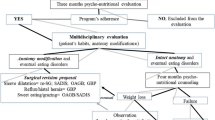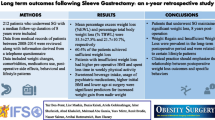Abstract
Background
Few studies have examined weight loss sustainability after sleeve gastrectomy (SG). The purpose of this study was to determine long-term outcome after SG and gastric bypass (GBP) and learn whether preoperative weight loss and binge eating behavior can be used to predict outcome.
Materials and Methods
Together, 257 patients (64 % women) were operated, 163 by GBP and 94 by SG. Binge eating was assessed by binge eating scale (BES) and preoperative weight loss was advised to all, including very low-calorie diet for 5 weeks. Postoperative visits took place at 1 and 2 years, and long-term outcome was at median 5 years (range 2.29–6.85). Multivariate linear regression analysis was used to predict outcome at 2-year and long-term control.
Results
Median age was 48 years, weight 141.1 kg, and BMI 48.2 kg/m2. Preoperative weight loss was median 4.9 % before GBP and 3.8 % before SG, P = 0.04. Total weight loss at year one was 24.1 % in GBP and 23.7 % in SG (P = 0.40), at year two 24.4 and 23.4 % (P = 0.26), and at long-term control 23.0 and 20.2 % (P = 0.006), respectively. Weight was analyzed in 93, 88, and 89 % of those alive, respectively. BES did not predict weight outcome, but larger preoperative weight loss predicted less postoperative weight loss at 2 years.
Conclusion
On long term, weight loss was better maintained after GBP compared with SG. Binge eating behavior was not a significant predictor, but larger preoperative weight loss predicted less postoperative weight loss for the next 2 years.


Similar content being viewed by others
References
Lahti-Koski M, Seppanen-Nuijten E, Mannisto S, et al. Twenty-year changes in the prevalence of obesity among Finnish adults. Obes Rev. 2010;11(3):171–6.
Swinburn BA, Sacks G, Hall KD, et al. The global obesity pandemic: shaped by global drivers and local environments. Lancet. 2011;378(9793):804–14.
Finkelstein EA, Khavjou OA, Thompson H, et al. Obesity and severe obesity forecasts through 2030. Am J Prev Med. 2012;42(6):563–70.
Sjostrom L, Lindroos AK, Peltonen M, et al. Lifestyle, diabetes, and cardiovascular risk factors 10 years after bariatric surgery. N Engl J Med. 2004;351(26):2683–93.
Carlsson LM, Peltonen M, Ahlin S, et al. Bariatric surgery and prevention of type 2 diabetes in Swedish obese subjects. N Engl J Med. 2012;367(8):695–704.
Karlsson J, Taft C, Ryden A, et al. Ten-year trends in health-related quality of life after surgical and conventional treatment for severe obesity: the SOS intervention study. Int J Obes. 2007;31(8):1248–61.
Puzziferri N, 3rd Roshek TB, Mayo HG, et al. Long-term follow-up after bariatric surgery: a systematic review. JAMA. 2014;312(9):934–42.
Livhits M, Mercado C, Yermilov I, et al. Preoperative predictors of weight loss following bariatric surgery: systematic review. Obes Surg. 2012;22(1):70–89.
Green AE, Dymek-Valentine M, Pytluk S, et al. Psychosocial outcome of gastric bypass surgery for patients with and without binge eating. Obes Surg. 2004;14(7):975–85.
Sallet PC, Sallet JA, Dixon JB, et al. Eating behavior as a prognostic factor for weight loss after gastric bypass. Obes Surg. 2007;17(4):445–51.
Scholtz S, Bidlake L, Morgan J, et al. Long-term outcomes following laparoscopic adjustable gastric banding: postoperative psychological sequelae predict outcome at 5-year follow-up. Obes Surg. 2007;17(9):1220–5.
Boan J, Kolotkin RL, Westman EC, et al. Binge eating, quality of life and physical activity improve after Roux-en-Y gastric bypass for morbid obesity. Obes Surg. 2004;14(3):341–8.
Latner JD, Wetzler S, Goodman ER, et al. Gastric bypass in a low-income, inner-city population: eating disturbances and weight loss. Obes Res. 2004;12(6):956–61.
Malone M, Alger-Mayer S. Binge status and quality of life after gastric bypass surgery: a one-year study. Obes Res. 2004;12(3):473–81.
Powers PS, Perez A, Boyd F, et al. Eating pathology before and after bariatric surgery: a prospective study. Int J Eat Disord. 1999;25(3):293–300.
Mechanick JI, Kushner RF, Sugerman HJ, et al. American Association of Clinical Endocrinologists, The Obesity Society, and American Society for Metabolic & Bariatric Surgery medical guidelines for clinical practice for the perioperative nutritional, metabolic, and nonsurgical support of the bariatric surgery patient. Obesity (Silver Spring). 2009;17 Suppl 1:S1–70.
Helmio M, Victorzon M, Ovaska J, et al. Comparison of short-term outcome of laparoscopic sleeve gastrectomy and gastric bypass in the treatment of morbid obesity: a prospective randomized controlled multicenter SLEEVEPASS study with 6-month follow-up. Scand J Surg. 2014;103(3):175–81.
Tell GS, Jeffery RW, Kramer FM, et al. Can self-reported body weight be used to evaluate long-term follow-up of a weight-loss program? J Am Diet Assoc. 1987;87(9):1198–201.
Gormally J, Black S, Daston S, et al. The assessment of binge eating severity among obese persons. Addict Behav. 1982;7(1):47–55.
Adams TD, Davidson LE, Litwin SE, et al. Health benefits of gastric bypass surgery after 6 years. JAMA. 2012;308(11):1122–31.
Buchwald H, Estok R, Fahrbach K, et al. Weight and type 2 diabetes after bariatric surgery: systematic review and meta-analysis. Am J Med. 2009;122(3):248–56. e5.
Kehagias I, Spyropoulos C, Karamanakos S, et al. Efficacy of sleeve gastrectomy as sole procedure in patients with clinically severe obesity (BMI ≤ 50 kg/m(2)). Surg Obes Relat Dis. 2013;9(3):363–9.
Grupski AE, Hood MM, Hall BJ, et al. Examining the binge eating scale in screening for binge eating disorder in bariatric surgery candidates. Obes Surg. 2013;23(1):1–6.
Wadden TA, Faulconbridge LF, Jones-Corneille LR, et al. Binge eating disorder and the outcome of bariatric surgery at one year: a prospective, observational study. Obesity (Silver Spring). 2011;19(6):1220–8.
Limbach KE, Ashton K, Merrell J, et al. Relative contribution of modifiable versus non-modifiable factors as predictors of racial variance in roux-en-Y gastric bypass weight loss outcomes. Obes Surg. 2014;24(8):1379–85.
Bond DS, Phelan S, Leahey TM, et al. Weight-loss maintenance in successful weight losers: surgical vs non-surgical methods. Int J Obes. 2009;33(1):173–80.
Colles SL, Dixon JB, O’Brien PE. Grazing and loss of control related to eating: two high-risk factors following bariatric surgery. Obesity (Silver Spring). 2008;16(3):615–22.
Bobbioni-Harsch E, Morel P, Huber O, et al. Energy economy hampers body weight loss after gastric bypass. J Clin Endocrinol Metab. 2000;85(12):4695–700.
Schutz Y, Tremblay A, Weinsier RL, et al. Role of fat oxidation in the long-term stabilization of body weight in obese women. Am J Clin Nutr. 1992;55(3):670–4.
Galtier F, Farret A, Verdier R, et al. Resting energy expenditure and fuel metabolism following laparoscopic adjustable gastric banding in severely obese women: relationships with excess weight lost. Int J Obes. 2006;30(7):1104–10.
Karlsson HK, Tuulari JJ, Tuominen L, et al. Weight loss after bariatric surgery normalizes brain opioid receptors in morbid obesity. Molecular Psychiatry. 2015 Oct online publication.
Christian NJ, King WC, Yanovski SZ, et al. Validity of self-reported weights following bariatric surgery. JAMA. 2013;310(22):2454–6.
Author information
Authors and Affiliations
Corresponding author
Ethics declarations
Conflict of Interest
The authors declare that they have no conflict of interest.
Statement of Human Rights
This study protocol was approved by the Ethics Committee of Helsinki University Hospital and performed in compliance with the Declaration of Helsinki. All procedures were performed in accordance with the ethical standards of the regional research committee and with the 1964 Helsinki declaration and its later amendments or comparable ethical standards.
Informed Consent
Informed consent was obtained from all individual participants included in the study.
Rights and permissions
About this article
Cite this article
Pekkarinen, T., Mustonen, H., Sane, T. et al. Long-Term Effect of Gastric Bypass and Sleeve Gastrectomy on Severe Obesity: Do Preoperative Weight Loss and Binge Eating Behavior Predict the Outcome of Bariatric Surgery?. OBES SURG 26, 2161–2167 (2016). https://doi.org/10.1007/s11695-016-2090-7
Published:
Issue Date:
DOI: https://doi.org/10.1007/s11695-016-2090-7




